
Refine Your Search Results with Magento 2 Elasticsearch Module
Need help with tuning search relevance for better customer experience? Magento 2 elasticsearch module ensures customers find the products they're looking for.
The article explores the working, prerequisites, and top elasticsearch module.
Key Takeaways
-
The Elasticsearch module improves search speed.
-
Elasticsearch indexes and retrieves product data.
-
Autocomplete and suggestions enhance the search experience.
-
Elasticsearch powers Magento’s layered navigation.
-
Configure and tune search relevance to meet customer needs.
-
8 Prerequisites for Installing Magento 2 Elasticsearch Module
-
7 Best Practices for Configure and Maintain Elasticsearch Module
What is the Magento 2 Elasticsearch Module?
The Magento 2 elasticsearch module is a built-in search engine integration. It replaces MySQL search starting from Magento 2.4.
The module connects Magento to Elasticsearch, a fast, scalable, open-source search platform. It helps handle large product catalogs.
The extension improves search speed and user experience. It is by offering features like typo tolerance and advanced filtering. It supports multi-language stores and enhances layered navigation.
Elasticsearch indexes product data and delivers accurate results, even under heavy traffic. It optimizes search functionality and ensures efficient, reliable performance across complex eCommerce setups.
How Magento 2 Elasticsearch Module Works?
1. Indexing Magento Data in Elasticsearch

-
Magento first collects all searchable product information, such as:
1. Product names
2. SKUs
3. Categories
4. Attributes
5. Descriptions
-
The data is then structured and pushed to the Elasticsearch engine as an index. The index is a specialized library catalog optimized for fast retrieval.
-
Magento performs indexing through cron jobs or via CLI commands. Any product updates like name changes or new SKUs trigger reindexing. It helps keep search results up to date.
2. Handling Customer Search Queries
-
When a visitor uses the search bar or filtering tools. Magento sends the search query to Elasticsearch instead of querying its database.
-
Natural Language Processing helps interpret the search. It can handle plural forms and synonyms.
-
Elasticsearch can correct spelling errors and even suggest results based on partial input. It reduces friction for users. It helps them find what they are looking for faster. It is even true with vague or misspelled search terms.
3. Returning Fast and Relevant Results
-
Once it processes the search query, Elasticsearch scores each matching product. It depends on relevance. Factors influencing the score may include:
1. Keyword match in the product name
2. Frequency of the keyword
3. Product Popularity
-
It returns the results in milliseconds and displays them in the Magento storefront. It ensures high-speed performance. This is true even for stores with extensive product catalogs or high traffic.
4. Real-Time Autocomplete and Suggestions

-
Elasticsearch supports real-time autocomplete. It shows product names or suggestions as the user types.
-
Pre-indexed terms handle it. Logic is set within the Magento admin or extended via third-party modules.
-
Users see instant suggestions before completing their search. It reduces search friction and enhances conversions by guiding users.
5. Powering Layered Navigation

-
Elasticsearch also supports Magento's layered navigation on category pages. It includes
1. Filtering by color or brand
2. Sorting results by relevance or name
-
Magento fetches this filtered data from Elasticsearch. It eliminates the need to use MySQL joins and lookups. It is far faster and more efficient.
6. Customization and Relevance Tuning
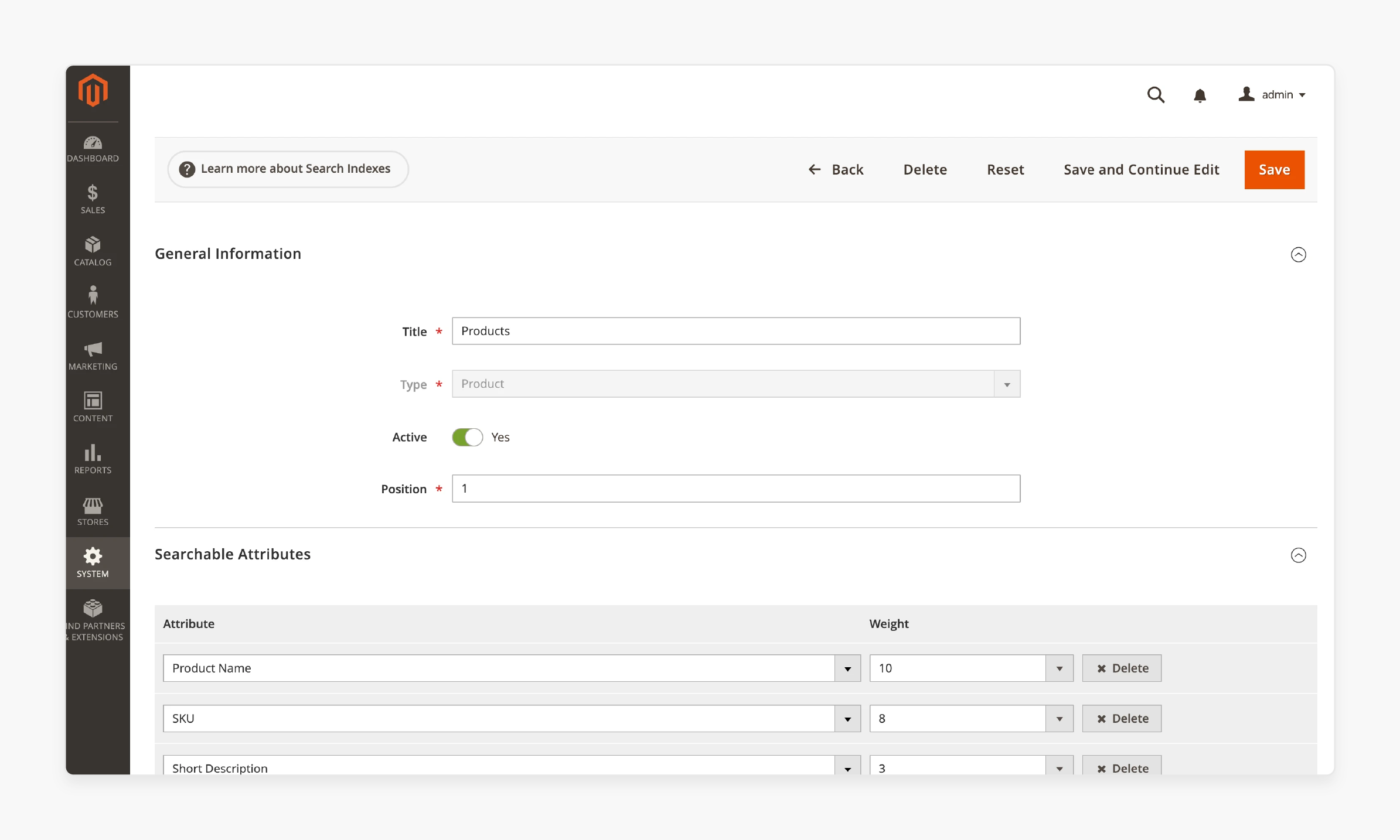
-
Magento allows store owners to control search behavior:
1. Focus on certain attributes like product name or SKU
2. Add synonym dictionaries
3. Tune the scoring logic to favor best-selling or high-margin products
-
Advanced store owners or developers can extend these features further. It uses custom modules or modifies Elasticsearch settings.
8 Prerequisites for Installing Magento 2 Elasticsearch Module
| Prerequisites | Explanation |
|---|---|
| 1. Magento Version Compatibility | Magento 2.4 and above requires Elasticsearch as the default catalog search engine. Magento 2.4.4 to 2.4.6 supports Elasticsearch 7.x. Magento 2.4.7+ introduces support for Elasticsearch 8.x. Earlier versions (2.3.x) support Elasticsearch. These are no longer recommended. |
| 2. Supported Elasticsearch Versions | Magento version 2.4.0 – 2.4.3 supports Elasticsearch version 7.6.x to 7.9.x. Magento version 2.4.4 – 2.4.6 supports Elasticsearch version 7.16.x. Magento version 2.4.7+ supports Elasticsearch version 8.x. Always verify compatibility before upgrading Magento or Elasticsearch. |
| 3. System Requirements | Use Linux-based operating systems such as Ubuntu and Debian. It requires at least 2GB RAM. Elasticsearch 7.x requires OpenJDK 11. Elasticsearch 8.x bundles its own Java runtime. It requires at least 5 GB of free disk space for indexing large catalogs |
| 4. Required Software | It requires Apache or NGINX web servers. Use PHP version 7.4, 8.1, or 8.2. It requires a Composer to manage Magento packages and dependencies. Use MySQL / MariaDB for Magento database operations. |
| 5. Elasticsearch Installation | You need to install Elasticsearch before configuring it with Magento. Install via .deb or .rpm packages or use Docker if preferred. Ensure the service is running. Make sure Elasticsearch is accessible at the default port. Ensure you can run CLI commands. |
| 6. Firewall and Network Configuration | Port 9200 must be open and not blocked by firewalls. Ensure Magento can connect to Elasticsearch on this port. |
| 7. Cron Jobs for Indexing | Magento uses cron to schedule automatic indexing. Ensure the proper configuration of the cron. |
| 8. SSL Certificate | If you host Elasticsearch in remote, especially in production. Secure it using SSL/TLS. Configure Magento to connect over HTTPS. |
3 Top Magento 2 Elasticsearch Modules
1. Elastic Search for Magento 2 - Amasty
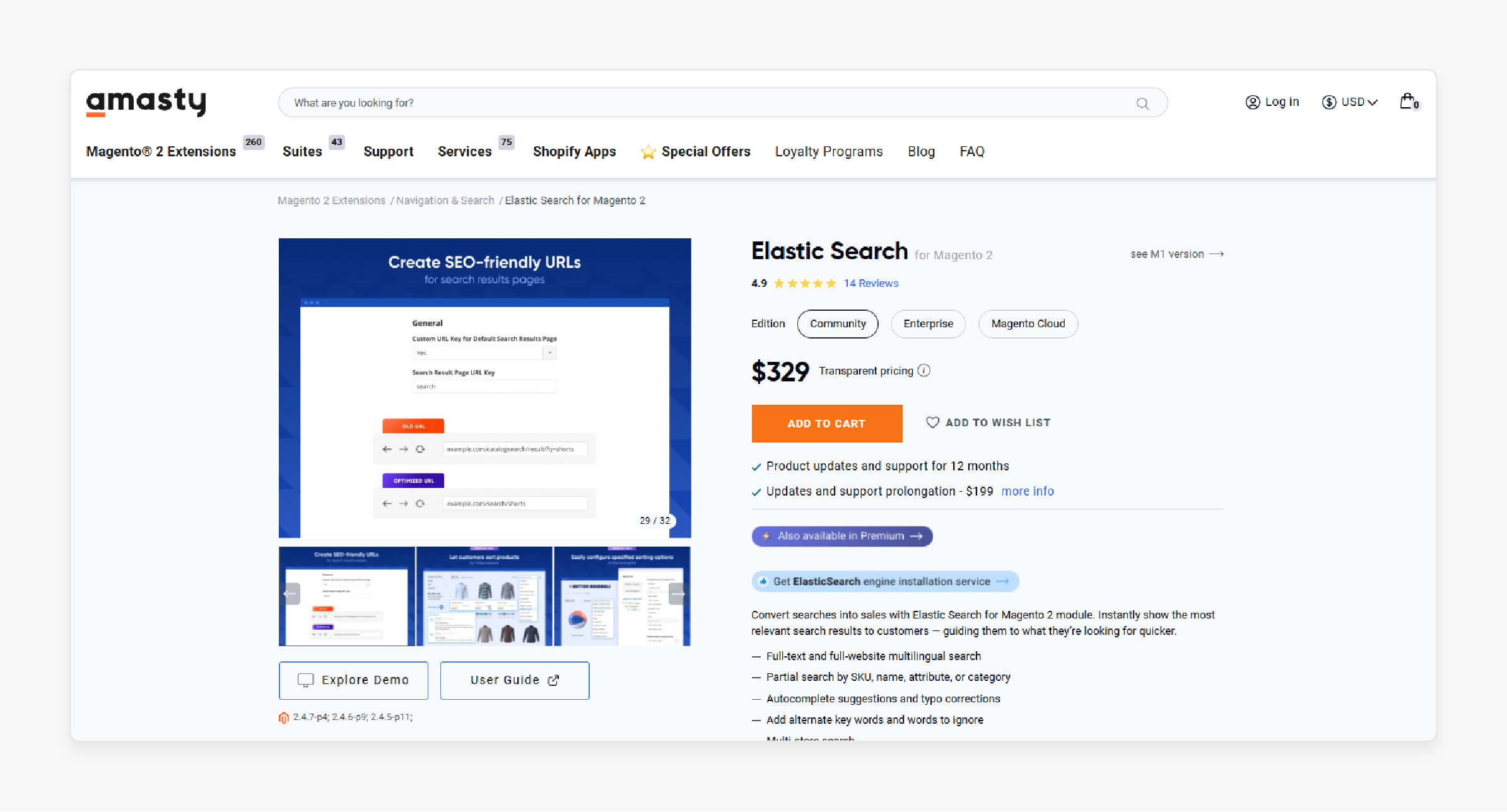
Amasty’s elastic search module converts searches into sales. The module shows the most relevant search results to customers. It guides them to what they are looking for. It is compatible with Magento 2.4.7-p4, 2.4.6-p9, 2.4.5-p11.
Key Features:
-
Full-text and full-website multilingual search
-
Partial search by SKU or category
-
Autocomplete suggestions and typo corrections
-
Add alternate keywords and words to ignore
-
Multi-store search
-
OpenSearch compatibility
-
Hyva-ready storefront
Price:
-
Magento Community Edition: $329 (12 months)
-
Magento Enterprise Edition: $629 (12 months)
-
Magento Cloud Edition: $929 (12 months)
2. Magento 2 Elasticsearch - Webkul
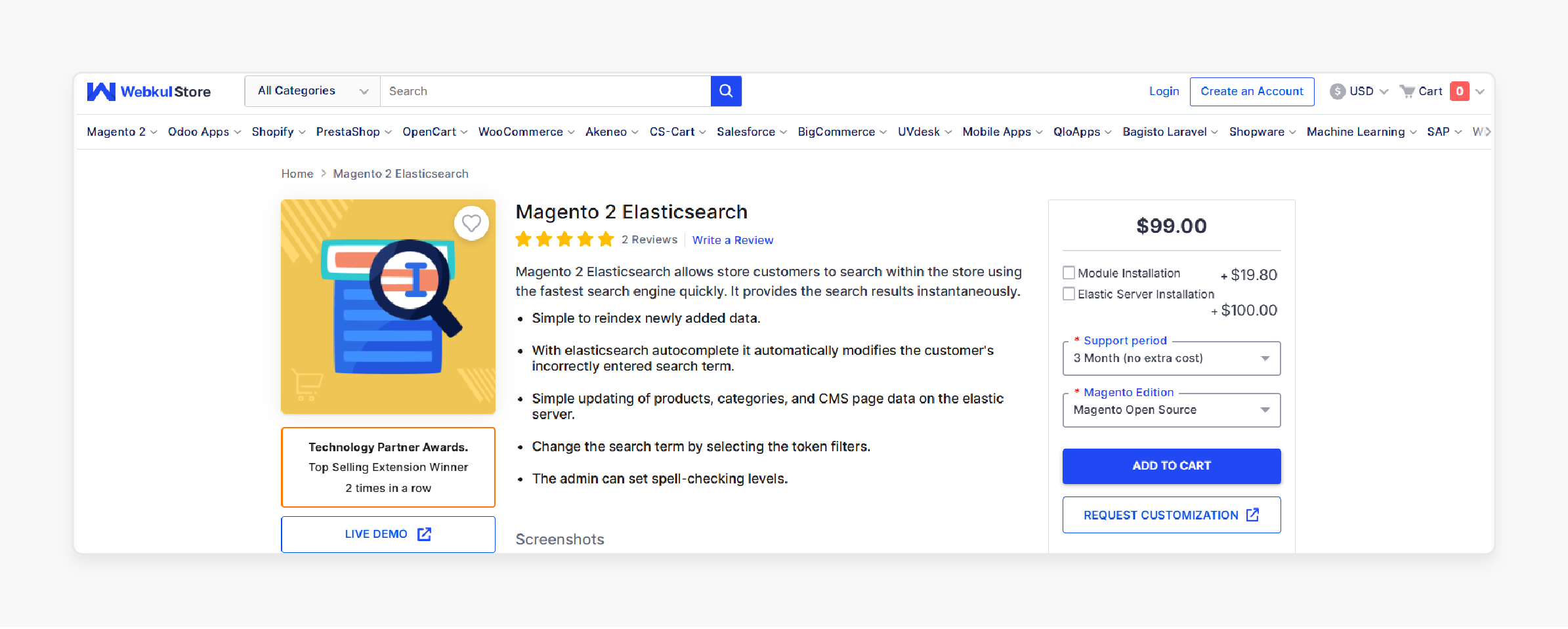
Webkul’s Magento 2 elasticsearch allows store customers to search within the store. It uses the fastest search engine. It provides instant search results. It is compatible with Magento 2.0.x, 2.1.x, 2.2.x, 2.3.x, 2.4.x.
Key Features:
-
Simple to reindex new data
-
Modifies the incorrect search term entered by customers
-
Simple updating of products and CMS page data on the elastic server
-
Change the search term by selecting the token filters
-
The admin can set spell-checking levels
Price:
-
Magento Open Source Edition: $148 (12 months)
-
Magento Adobe Commerce Edition: $297 (12 months)
3. Magento 2 Elasticsearch Extension - Mirasvit
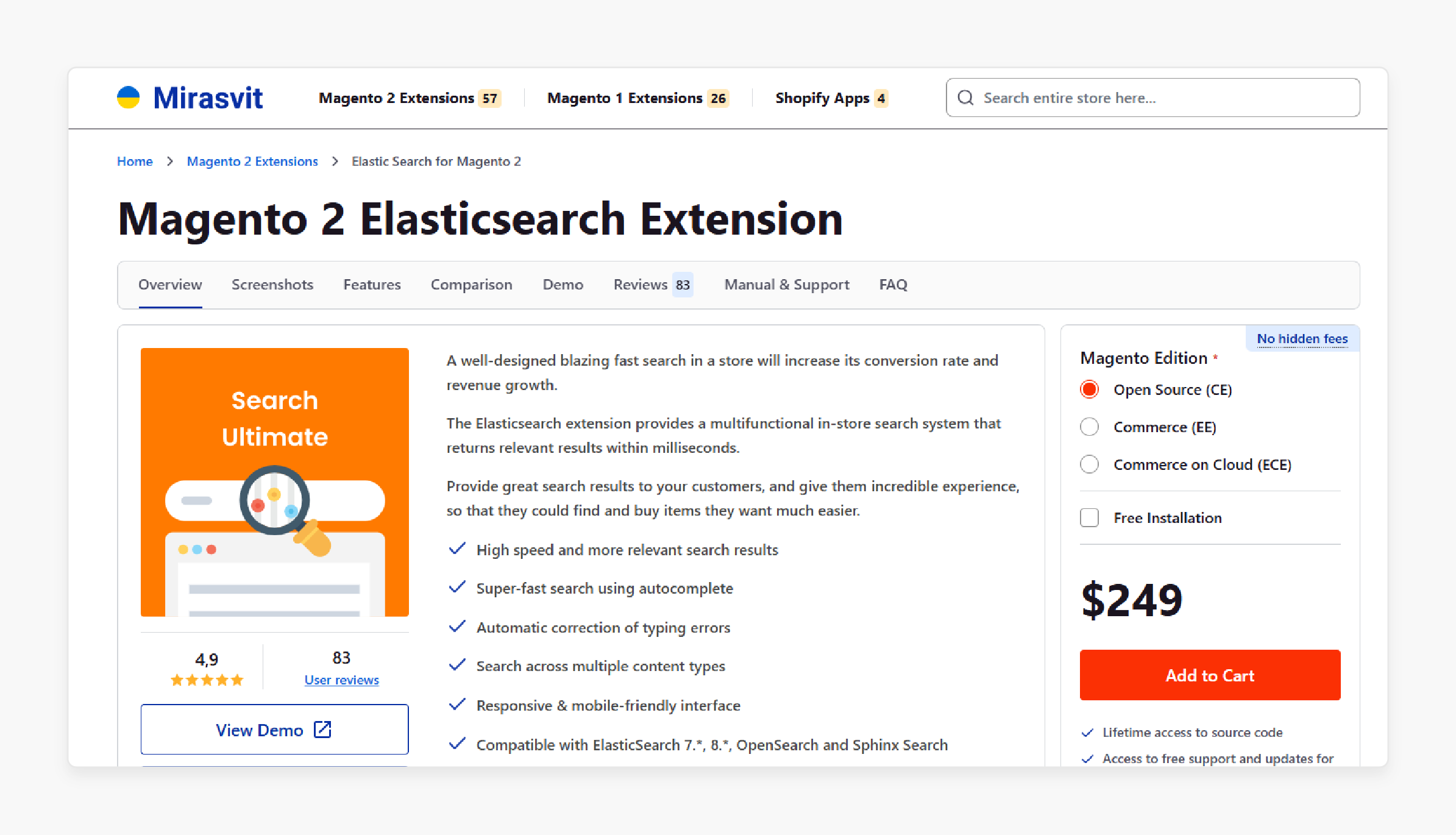
Mirasvit’s Elasticsearch extension provides a multifunctional in-store search system. It returns relevant results within milliseconds. The module provides great search results to your customers. It gives them an incredible experience. They can find and buy the items they want with much more ease. It is compatible with Magento 2.3.* - 2.4.7.
Key Features:
-
High-speed and more relevant search results
-
Super-fast search using autocomplete
-
Automatic correction of typing errors
-
Search across various content types
-
Responsive & mobile-related interface
-
Compatible with ElasticSearch and Sphinx Search
Price:
-
Magento Open Source Edition: $249 (12 months)
-
Magento Commerce Edition: $539 (12 months)
-
Magento Commerce on Cloud Edition: $829 (12 months)
7 Best Practices for Configure and Maintain Elasticsearch Module
1. Proper Configuration for Optimal Performance
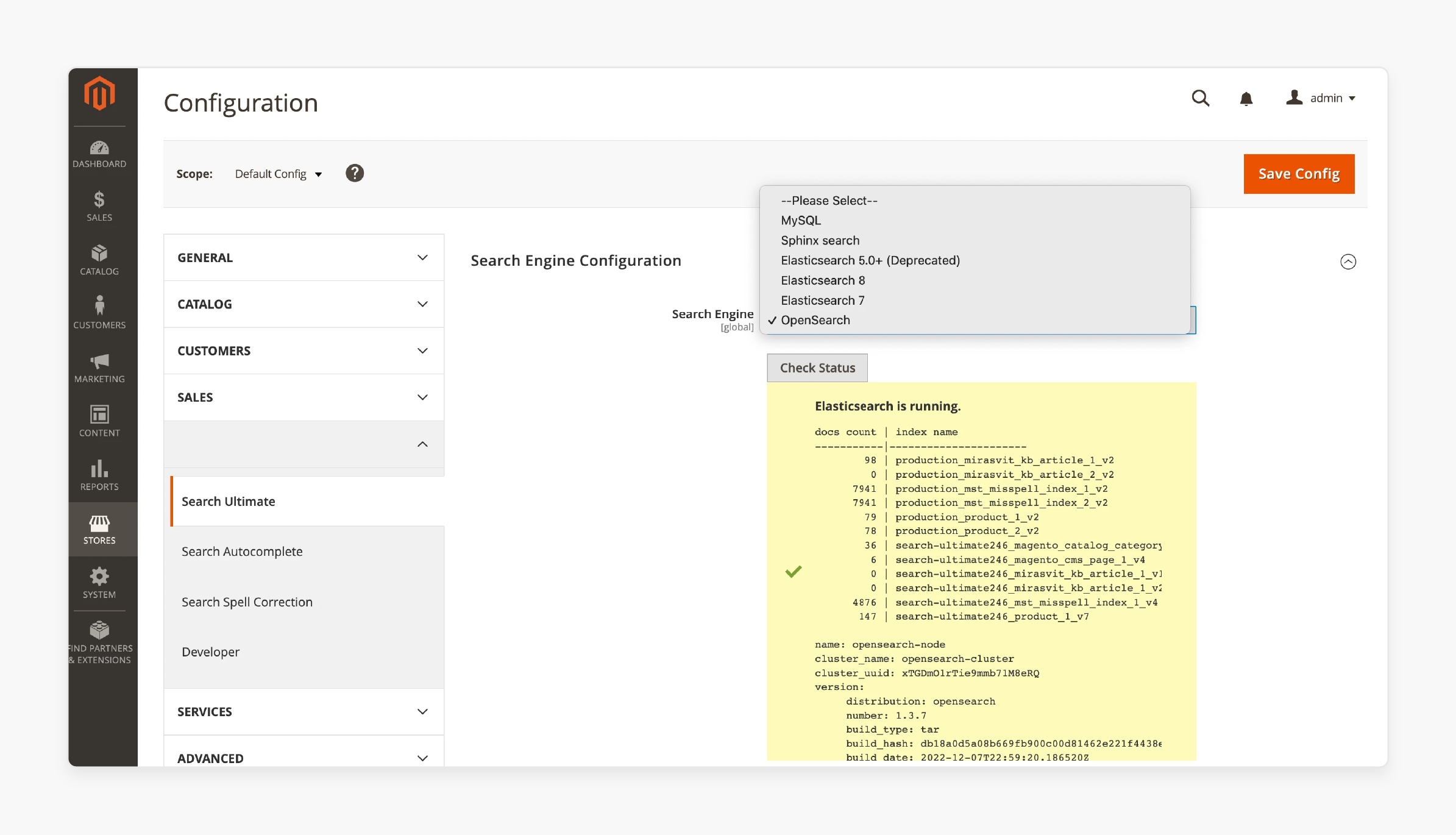
-
Ensure Elasticsearch is set as the default catalog search engine in Magento 2. It should use the proper Magento CLI command.
-
Use a custom index prefix to avoid conflicts with other Magento stores. It is possible on the same Elasticsearch instance. Configure Elasticsearch to provide search suggestions and autocomplete.
-
Ensure the hostname and port number are correct in the Magento admin panel. It is possible under the Elasticsearch server hostname. Use a dedicated Elasticsearch user for Magento connections with limited permissions for security.
-
Set indexing and reindexing intervals based on the store’s size and update frequency. Enable "Reindex on Save" in the admin panel for large catalogs. It indexes the products immediately after edits.
-
Adjust relevance settings to focus on certain attributes like product name or SKU. It is by editing the Elasticsearch scoring method. Use custom synonym lists for industry-specific terms.
2. Optimize Elasticsearch Performance
-
Elasticsearch is memory-intensive. Divide enough RAM for efficient performance. For Elasticsearch 7.x, set Xmx and Xms to 50% of available RAM.
-
Check Elasticsearch logs to detect errors or slow query times. Address issues such as slow queries and indexing problems.
-
Enable slow log in Elasticsearch to track long-running queries. Adjust the autocomplete feature. It helps ensure it doesn’t overload Elasticsearch with unnecessary queries.
-
Maintain and update your synonym list to improve search accuracy.
3. Regular Maintenance of the Magento 2 Elasticsearch Module
-
Check the index status and reindex when necessary. Set up a cron job for automatic reindexing during off-peak hours.
-
Verify that Elasticsearch is running. Ensure no unassigned shards or cluster issues exist.
-
Back up your Elasticsearch data and configurations. Use tools like snapshot API to create backups for disaster recovery.
-
Always run the latest stable version of Elasticsearch that is compatible with Magento. For Magento 2.4.7 and above, you can use Elasticsearch 8.x. You should test compatibility before upgrading.
-
Review and refine your search relevance tuning settings every 6 months. Search behavior and user expectations change over time.
-
Consider implementing new features like machine learning-based search ranking.
4. Indexing Strategy
-
Use scheduled indexing during off-peak hours to reduce the impact on server performance. Avoid manual indexing during peak times, which can cause significant resource strain.
-
Magento supports partial reindexing. It indexes only the affected data instead of the entire catalog. It helps to cut downtime during indexing.
-
Magento allows various indexing profiles. Ensure that your indexing strategy aligns with your catalog size and update frequency.
5. Security Considerations
-
Use firewalls and access controls to restrict access to your Elasticsearch server. Ensure that Elasticsearch is not exposed to the public internet.
-
Enable authentication to prevent unauthorized access. Use TLS encryption for secure data transmission between your Magento store and Elasticsearch.
6. Tune Search Relevance
-
Use Magento’s built-in features to customize search results ranking. It helps improve the relevance of search results. You can adjust factors like product attributes and user behavior.
-
Use synonym lists and stop words to improve search quality. It ensures that customers find the most relevant products. It is possible even when using different search terms.
7. Clear Unnecessary Data
-
Clean up old indexes that are no longer needed. Elasticsearch can store much data. Clearing out unnecessary indexes can improve performance.
-
Define a data retention policy for your Elasticsearch indices. It helps avoid unnecessary storage overhead.
FAQs
1. Why should I use Elasticsearch in Magento 2?
Elasticsearch improves search speed and accuracy, even with large product catalogs. It offers advanced features like typo tolerance and fast real-time suggestions. It leads to better customer satisfaction and higher conversion rates.
2. What versions of Elasticsearch are compatible with Magento 2?
Magento 2.4.x supports Elasticsearch 7.x. Magento 2.4.7+ is compatible with Elasticsearch 8.x. You should verify compatibility before upgrading to avoid issues. Earlier Magento versions are no longer recommended for Elasticsearch integration.
3. How does indexing work in Magento 2 Elasticsearch?
Magento collects product information, including names and attributes. Sends it to Elasticsearch as an index. Updates like name changes or new SKUs trigger reindexing. It ensures that search results remain current.
4. How does Elasticsearch handle customer search queries?
When a customer searches, Magento sends the query to Elasticsearch. It processes it using natural language processing. Elasticsearch corrects spelling errors and returns relevant search results. It is possible even for vague or misspelled queries.
Summary
The Magento 2 elasticsearch module is a search engine that replaces MySQL search. The article explores the key features of the module, including:
-
Faster and more relevant search results with typo tolerance and advanced filtering.
-
Real-time autocomplete reduces search friction and boosts conversions.
-
Enhanced layered navigation allows efficient filtering and sorting options.
-
Customizable search behavior allows store owners to fine-tune results.
Unlock faster, more accurate search results for your store with the elasticsearch module. Pair it with managed Magento hosting for optimal performance and reliability.




